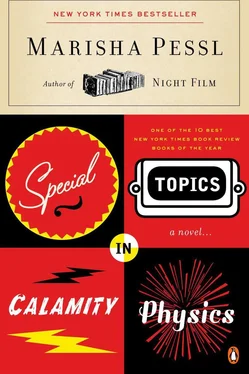Outside, I walked around the house some twenty times in the dark. I stared into the fishpond, devoid of fish. I returned inside, sat on the couch watching Cherry Jeffries, picking at the half-eaten bowl of fruit, which the radicals had allowed Dad to prepare before they carried him away.
“My daughter has to eat!” Dad commanded.
“Fine,” said the Nasty One. “But be quick about it.”
“Would you like some help cutting the cantaloupe?” asked another.
I couldn’t stop picking up the phone, staring at the receiver, asking, “Should I report him missing to the police?” I waited for it to tell me, “Yes, Definitely,” “My Reply Is No” or “Concentrate and Ask Again.” I could call the Sluder County Sheriff’s Department, tell A. Boone I had to speak to Detective Harper. “Remember me? The one who talked to you about Hannah Schneider? Well, now my father’s missing. Yes. I keep losing people.” Within an hour, she’d be at the door with her pumpkin hair and complexion of refined sugar, narrowing her eyes at Dad’s vacant reading chair. “Tell me the last thing he said. Does your family have a history of mental illness? Do you have anyone? An uncle? A grandmother?” Within four hours, I’d have my own green folder in the filing cabinet next to her desk, #5510-VANM. An article would appear in The Stockton Observer , “Local Student Angel of Death, Witness to Teacher’s Demise, Now Missing Father.” I hung up the phone.
I searched the house again, this time not allowing myself to whimper, not allowing myself to miss a thing, not the shower curtain, or the cabinet under the bathroom sink full of Q-tips and cotton balls, or even the roll of toilet paper inside of which he might have taken a moment to scrawl, They’ve taken me do not worry with a toothpick. I examined every book we’d returned to the shelves the night before in the library, for he might have swiftly slipped a page of legal paper into its pages on which he’d written, I’ll get out of this I swear. I turned over every one, shook them, but found nothing at all, apart from The Heart of the Matter losing another clump of pages. This searching continued until Dad’s bedside clock read that it was after 2:00 A.M.
Denial is like Versailles; it isn’t the easiest thing to maintain. To do so took an astounding amount of resolve, oomph, chutzpah, none of which I had, starfished as I was across the black-and-white tiles of Dad’s bathroom floor.
Clearly, I had to accept the notion of Dad’s kidnapping being up there with the Tooth Fairy, the Holy Grail or any other dream concocted by people bored to tears with reality, wanting to believe in something bigger than themselves. No matter how charitable these radicals were, they wouldn’t have permitted Dad to pack each and every one of his personal items, including checkbooks, credit cards and statements, even his favorite needlepoint by June Bug Dorthea Driser, the tiny, framed “To Thine Own Self Be True,” which had been hanging to the right of the kitchen telephone, now gone. They also would have put their foot down when Dad took a half hour to cherry-pick the selection of texts he wished to take with him, Maurice Girodias’ Olympia Press 1955 two-volume edition of Lolita, Ada or Ardor, the Paradise Lost he hadn’t wanted me to throw, the hulking Delovian: A Retrospective (Finn, 1998), which featured Dad’s favorite work, the appropriately titled Secret (see p. 391, #61, 1992, Oil on linen). Also missing were La Grimace, Napoleon’s Progress, Beyond Good and Evil and a photocopy of “In the Penal Colony” (Kafka, 1919).
My head throbbed. My face felt tight and hot. I pulled myself out of the bathroom into the middle of Dad’s spongy bedroom carpet, the one thing he loathed about the house—“one feels as if one is walking on marshmallows”—and began to cry, but after a while, my tears, either bored or frustrated, sort of quit, threw in the towel, stormed off the set.
I didn’t do anything but stare at the bedroom ceiling, so pale and quiet, dutifully holding His tongue. Somehow, out of pure exhaustion, I fell asleep.
For the next three days — frittered away on the couch in front of Cherry Jeffries — I found myself imagining Dad’s final moments in our house, our beloved 24 Armor Street, setting of our last year, our last chapter, before I “conquered the world.”
He was all plan and calculation, all bird-quick glances to his wristwatch, five minutes fast, silent steps through our dim-drenched rooms. There was nervousness too, a nervousness only I’d be able to detect; I’d seen him before a new university, giving a new lecture (the barely discernible trembling of index fingers and thumbs).
The change in his pocket rattled like his withered soul as he moved through the kitchen, downstairs to his study. He turned on only a few lamps, his desk lamp and the red one on his bedroom nightstand that drowned the room in the jelly-red of stomachs and hearts. He spent a great deal of time organizing his things. The Oxford shirts on the bed, red on top, followed by blue, blue patterned, blue-and-white stripe, white, each folded like sleeping birds with wings tucked under them, and the six sets of cufflinks in silver and gold (including, of course, his favorite, those 24-karat ones engraved with GUM, given to Dad for his forty-seventh birthday by Bitsy Plaster, age 42, a misprint by the jeweler due to Bitsy’s bubbly handwriting) all tucked into the Tiffany felt pocket like a bag of prized seeds. And then there were his socks herded together, black, white, long, short, cotton, wool. He wore his brown loafers (he could walk fast in them), the gold and brown tweed (faithfully hanging around him like an old dog) and the old khaki slacks so comfortable he claimed “they made the most unbearable tasks bearable.” (He wore them trudging through the “squishy Thesis Statements, fetid quagmires of Supporting Evidence” inevitably found within student research papers. They even allowed him to feel no guilt as he wrote C-next to the kid’s name before continuing on, relentlessly.)
When he was ready to load the boxes and duffle bags into the car — I didn’t know what waited for him; I imagined a simple yellow cab driven by some sea urchin driver with goose-bumped hands, tapping the steering wheel to Public Radio’s Early Bluegrass Hour , waiting for John Ray Jr., Ph.D., to emerge from the house, thinking about the woman he left at home, Alva or Dottie, warm as a dinner roll.
When Dad knew he’d forgotten nothing, when it was all gone, he walked back inside and up to my room. He didn’t turn on a light, or even look at me as he unbuckled my backpack and perused the legal pad on which I’d scrawled my research and theory. After he reviewed what I’d written, he returned it to the bag and hung it on the back of my desk chair.
He was incorrect putting it there. That wasn’t where I’d put it; I’d placed it where I always did, at the end of my bed on the floor. Yet he was pressed for time and no longer needed to worry about such details. Such details mattered very little now. He probably laughed at the Irony. At the most unlikely of moments, Dad took time to laugh about the Irony; or, perhaps it was one instance he didn’t have time to, because if he moved toward Laughter, he might have to continue down that shoulderless, exitless road of Feeling, which could lead one, rather swiftly, into Whimpering, Full-on Howling and he didn’t have time for that kind of detour. He had to get out of the house.
He looked at me as I slept, memorizing my face as if it were a passage of an extraordinary book he’d come across, the crux of which he wished to commit to memory in the off chance he found use for it during an exchange with a Dean.
Читать дальше












